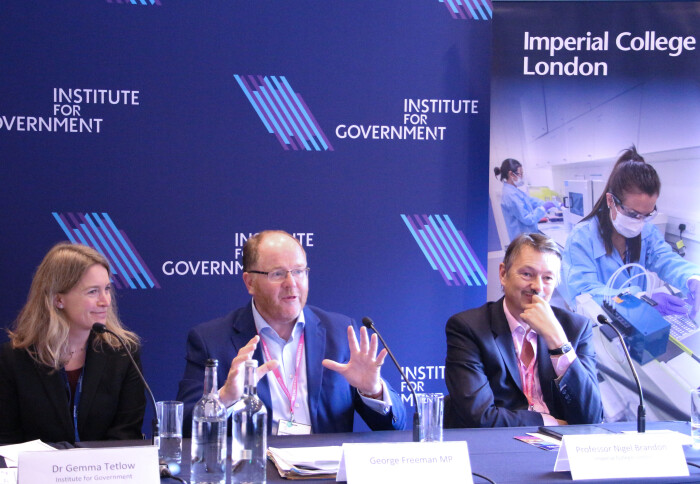Imperial expert at Conservative Party Conference

Imperial College expert joins panel discussion on science and innovation supporting economic growth at Conservative Party Conference 2023.
Professor Nigel Brandon (Dean of the Faculty of Engineering at Imperial) spoke at the Conservative Party annual conference in Manchester last week as part of a panel discussion on science and innovation supporting an ambitious plan for economic growth.
Imperial partnered with the Institute for Government for a panel event at the Conference, where Professor Nigel Brandon was joined by George Freeman MP, Minister of State at the Department for Science, Innovation and Technology, Katherine Bennett, Chief Executive Officer at the High Value Manufacturing Catapult and Giles Wilkes, senior fellow at the Institute for Government. Chaired by Dr Gemma Tetlow, Chief Economist at the Institute for Government.
Science and innovation contributing to UK economic growth
Minister for Science, Research and Innovation, George Freeman spoke about the need to shift our economic model to one in which this country embraces a genuine role as a powerhouse of research, science, technology and innovation for the global challenges we face. He set out ambitions for the Department for Science, Innovation and Technology (DSIT) to encourage secondments from the science and technology sector and ensure staff are integrating themselves within the sector.
The Minister said we need to build digital regulatory frameworks and a more agile, entrepreneurial Whitehall. He also highlighted several R&D clusters across the country and flagged the challenges they are experiencing around skills and devolution which is holding them back from realising their full potential.
The value of universities in achieving economic growth through R&D was set out by Professor Nigel Brandon. He highlighted Imperial’s academic and student start-ups which, combined, have attracted £600m of external investment and supported almost 6,000 jobs. He made the point that sustained investment and a pipeline of talent is needed to ensure initiatives are supported in the long-term. At Imperial, over 55% of publications have an international co-author, spanning 192 countries. He cautioned that the competition in R&D is not between UK regions but instead with growing markets such as China and the US. As a result, we need to work competitively and constructively to achieve the best outcomes.
Katherine Bennett echoed these comments, stating the UK has been recognised for many years as a global leader in research. However, we have a reputation for allowing the commercialisation of innovative ideas to be lost. She explained her Catapult is made up of 4,000 employees within 7 centres of innovation and 25 sites across the UK and represent one of the largest manufacturing capabilities in Europe. Catapults have the potential to play a strong role in supporting businesses to de-risk innovation and translate this into valuable products and services.
Giles Wilkes reflected on the importance of openness and agreed you cannot become a science superpower without cross-border collaboration. He praised the return of the UK to the EU Horizon science programme as another positive step towards this.
UK skills and talent pipeline
The challenge around skills and attracting talent to the UK was explained by Professor Nigel Brandon. To match our ambitions of higher R&D intensity, we need to fund the UK STEM skills pipeline sustainably. The cost of delivering a world-class STEM education to home students at Imperial exceeds the tuition fee income in every case, with an average deficit of £4,800 per student. We must ensure we are attractive to those within the UK and abroad via accessible visas to retain students.
The Minister echoed the sentiment, agreeing that universities are having to subsidise UK teaching with overseas students and R&D has suffered which isn’t a sustainable basis for achieving our ambitions as a science superpower. He made it clear that we cannot be a global science superpower behind a visa paywall, and we must ensure we are a hub of global talent.
Article text (excluding photos or graphics) © Imperial College London.
Photos and graphics subject to third party copyright used with permission or © Imperial College London.
Reporter
Lauren Asplin
College Headquarters